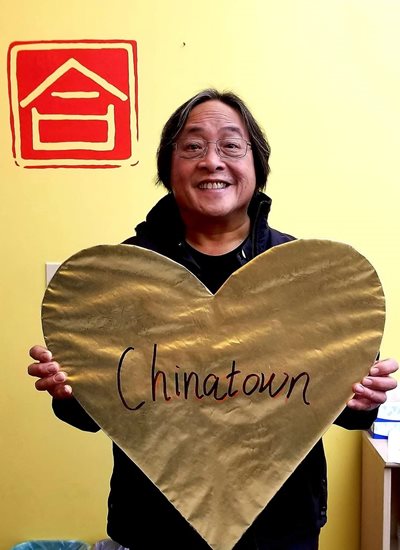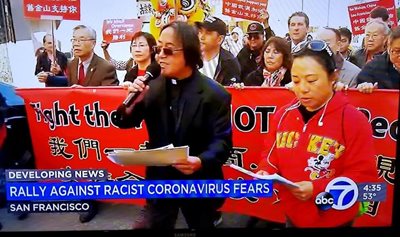In a way, the gathering of older, monolingual residents in what has become a Chinatown Town Hall started with egg salad. "We had these Sunday lunches," recalls the Rev. Norman Fong, who spent 30 years at the helm of Chinatown Community Development Center. "When we started, we didn't have a lot of money, so I asked my church to make egg salad sandwiches."
 Chinatown residents gathered for the food. But primarily, they gathered to talk about what was important to them and to their home and neighborhood, as Fong had intended. Now, the lunches for the meetings, known as Super Sundays, come from local restaurants. And at times, there are so many residents talking and sharing, the gathering is split into two groups. As Fong says, 700 people can't fit in one room.
Chinatown residents gathered for the food. But primarily, they gathered to talk about what was important to them and to their home and neighborhood, as Fong had intended. Now, the lunches for the meetings, known as Super Sundays, come from local restaurants. And at times, there are so many residents talking and sharing, the gathering is split into two groups. As Fong says, 700 people can't fit in one room.
While COVID-19 interrupted the gatherings, the pandemic did not diminish the group's spirit or strength. And it's poignant moments like these that Fong is known for, centering neighborhood community development around the residents who live there.
This month, he will receive the NeighborWorks Founders Award, presented to those whose legacy and values – equity, inclusion, integrity and service – remain at the core of NeighborWorks. Donald R. Phoenix, whose involvement with NeighborWorks and the network spanning 43 years, will also receive a Founders Award on March 30 during the NeighborWorks Executive Symposium.
‘A Chinatown kid'
Fong describes himself as "a Chinatown kid." His mother was born there in 1919, and his father came to the neighborhood the same year, via Angel Island, during the Chinese Exclusion Act, which limited the number of Chinese immigrants to the United States and the jobs they could seek.
"I inherited caring for our neighborhood from both of my parents," Fong says. "I promised them I would stay to work in Chinatown all my life. I've been faithful to that."
would stay to work in Chinatown all my life. I've been faithful to that."
As a teenager, he learned firsthand the importance of safe housing when his family was evicted from their apartment. His Presbyterian church helped his family find a new home, saving them from homelessness. At the same time, his church took over a senior community housing project. "I learned early on that faith-based organizations can get involved with housing," he says.
Fong became a youth pastor at the Presbyterian Church in Chinatown, running programs at a community youth center with a focus on immigrant youth. In 1981, after graduating from San Francisco Theological Seminary, he was ordained as a Presbyterian minister and still serves as a pastor at the Chinatown church. In 1990, he also began working at Chinatown CDC as deputy director and then executive director.
"The first thing I did was start a youth program at the housing corporation," he says. "People said, ‘We're not a youth agency; we build affordable housing.'" But Fong told them: "We need to build for the next generation and let them take the lead."
He continued to work to empower youth and immigrant seniors for most of his career. Among the innovations he brought to the neighborhood was the youth-led Chinatown Alleyway Tour program where youth teach visitors about the life, history and issues of Chinatown.
He's also proud of the redevelopment of the International Hotel, better known as the I-Hotel. A home to low-income Filipino and Chinese residents in the 1960s, the original owners evicted tenants in the 1970s, demolishing the building. "It was a movement to get rid of Chinatown," Fong recalls. "I cried. How could they do that to seniors?"
Multiple groups fought for control of the site; however, in 1998, Chinatown CDC was chosen to redevelop it into 104 units of affordable senior housing and community space. "Now it's standing strongly as a symbol of San Francisco," Fong says.
The organization also rehabbed other housing complexes, including Ping Yuen Public Housing – his old apartment complex – creating safe, stable homes for residents. Chinatown CDC now has 36 buildings with an estimated 4,500 units – and households served. More construction projects are in the pipeline.
"My philosophy was that we, as NeighborWorks, as community-based organizations, can't run from the top down. We have to empower people to speak," Fong says. "It's bottom-up organizing that makes the difference in the end, learning to love and care for our senior residents and empowering our youth. When I started the youth project, I went to the schools and went to every English as a Second Language class and told them: You can make a difference; you can change Chinatown and make it better."
Along with his leadership duties, Fong has also performed (vocals and saxophone) with Jest Jammin', Chinatown's soul band since 1968. They're still playing and have a performance next week at Chinatown's Cherry Blossom Festival.
Though he will officially retire in April – Chinatown CDC's 46th anniversary – Fong retains the title of "community ambassador for Chinatown CDC" and was an inspiration to current Executive Director Malcolm Yeung. The two met when Yeung was a law clerk for a legal services organization based in Chinatown. Fong led a tour of the neighborhood, as he has for dozens and dozens of people over the years, including nearly everyone who works on the 200+ staff of Chinatown CDC.
"I was welcomed by the most loving and positive spirit I have ever met," Yeung recalls in the application letter nominating Fong for the award. "Norman proceeded to introduce us to the historic struggles against displacement, struggles for more affordable housing, and stronger tenants' rights waged by the Chinatown community for the past 150 years." Yeung adds when he left that orientation, he knew his own career would be bound to the fight for justice and equity for Chinatown.
Others at Chinatown CDC – and outside of it – have similar stories that link their inspiration and their careers back to Fong. Yeung views Fong as a foundational leader in the field of "place-based people power." The NeighborWorks Founders Award is the latest recognition for Fong, who was also honored by President Barack Obama as a Champion of Change in 2012 for his work on resident engagement and promoting quality housing – and quality of life.
"Norman is not only my hero," Yeung says. "He is and always will be Chinatown's hero."
03/29/2023

